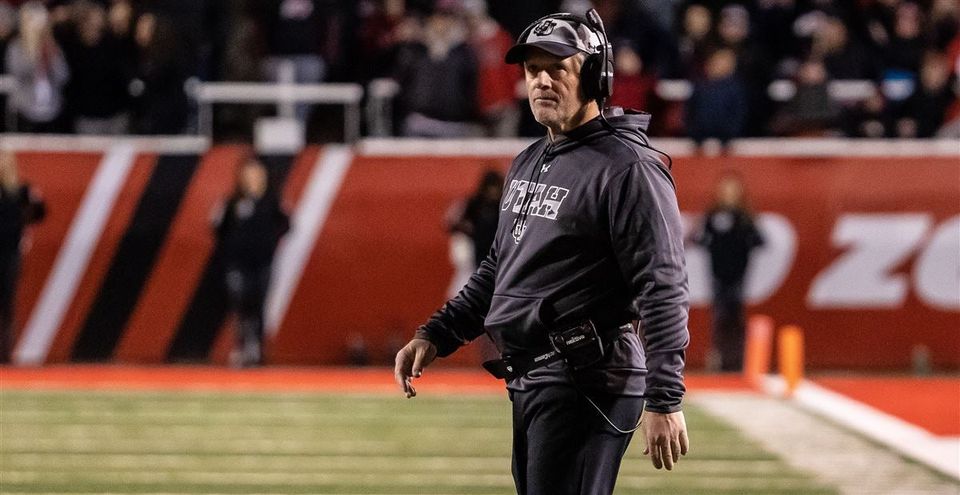Kyle Whittingham Field at Rice Eccles Stadium

Kyle Whittingham is preparing for his team’s fourth conference championship game in five years, a feat no other Pac-12 coach – and few outside the conference – can claim. Despite playing in what is believed by its fans to be the most competitive top-to-bottom Power 5 conference, the myriad reasons the bigger brands in the conference – UCLA, Washington, Oregon, Stanford, and Cal are undeniably much larger brands than Utah – should be out-performing his team, and the hardships and tragedies along the way, Kyle Whittingham and the Utah Utes persist.
Another shot at a conference championship means a shot at finishing Utah’s ascent to the top of the Pac-12 Conference, no longer a program riding the residuals of a lone championship win, but rather a defense of a title, and a continued upward trajectory for the program, with the latter two of its four championship appearances ending in wins, rather than stealing one of four and leaving Las Vegas with a disappointing 1-3 record in conference championship games.
From a high level, this season looks a lot like last. Utah finished the regular season 9-3, is in the Pac-12 Championship game in spite of disappointing non-conference results, and is facing a team it beat at home earlier this season. This year’s opponent is far more formidable, or at least appears so on paper. In 2021, Utah prepared to rematch a team it had just beaten by 28 points. There was far more confidence among Utah fans and general college football pundits that the Utes would take home their first Pac-12 Championship trophy. This season, the fans and pundits are far less confident, as this USC team, led by head coach Lincoln Riley and Heisman Trophy favorite-slash-Quarterback-slash-Time-and-Space Bender Caleb Williams, appear capable of beating any team on sheer force of offense alone. Notably, this was not enough to beat Utah in USC’s lone loss this season, a one-point, 43-42 classic in Salt Lake City.
USC has the more prestigious brand, the A-list head coach, and the talent edge on paper across the board. Whittingham is renowned for fielding one of the toughest and best-developed teams in the country, and because of Utah’s continual improvement in recruiting, has more talent than he has ever had. Utah is not necessarily outmatched on Saturday, but they’re not going to have this one handed to them in the first half.
The past two decades have been undeniably the best of Utah Football’s history. Those 20 years contain Utah’s six biggest games: 2 victories in the Fiesta and Sugar Bowls, the loss to Ohio State in this year’s Rose Bowl Game, and a 1-2 record in Pac-12 Championship Games.
Kyle Whittingham first came to Utah in 1994 as defensive line coach under head coach Ron McBride alongside defensive coordinator and father, Fred Whittingham Sr. The following year Whittingham took over his father’s vacated position as defensive coordinator, a position he held for the remainder of McBride’s storied career at Utah, as well as through the career of budding college football superstar head coach Urban Meyer.
Meyer’s time at Utah was the catalyst that moved Utah into a new tier of college football prominence. In his two years at Utah, Meyer turned the Utes into a top 5 team and BCS bowl champion, something no non-BCS power had ever done. Those Urban Meyer teams are remembered for his electric offense, and star quarterback Alex Smith, but the defensive units were some of Utah’s best, with the majority of the starters from the Fiesta Bowl defense spending time on NFL roster. Whittingham’s contribution to the Utah defense are not lost on the leader of those teams. Despite their short time together, Meyer has repeatedly complimented Kyle Whittingham and said he is one of the most underrated coaches in college football, no doubt because of the importance the defensive mind and thought partner was for those Utah teams.
Whittingham’s first couple of seasons as head coach at Utah were unlike Meyers; his teams did not explode out of the gate, but rebuilt over a couple of seasons under starting quarterback Brian Johnson. The extra leeway and growing time Whittingham had in his first couple of seasons allowed him to do what he has continually done at Utah, develop young talent to punch way above their recruiting class.
That development culminated in another new height for Utah Football, it’s second BCS bowl appearance, this time in the Sugar Bowl against Alabama and Nick Saban, in his second year as head coach of the Crimson Tide. If Urban Meyer was the aforementioned catalyst to bring Utah into the next tier of football prominence, Kyle Whittingham was the steeled resolve and cultural cornerstone that it took to keep them there.
For a large and growing swath of Utah (and college football) fans, it is impossible to imagine Utah without Kyle Whittingham. Children who were born the year Kyle Whittingham was hired as head coach at Utah will be graduating this spring. Those born when he was hired as defensive line coach at Utah will be turning 30 next year. Those born when he was at BYU are not reading this, because the internet is confusing and vast.
Whittingham has never been shy about his intentions to retire on time. There aren’t very many other professions where 65 is considered young to hang it up, particularly as a multi-millionaire, but college football is lousy with legendary or past-their-prime coaches holding on until well into their 70’s. This has never been an aspiration of Whittingham’s, who has emphasized that he intends to spend his retirement years with his grandkids, and who turned 63 at the end of this season.
The next era will look pretty familiar to the current one. An important condition when discussion Whittingham’s eventual retirement, is that it is from coaching. His most recent contract “extension” was his first that didn’t extend his deal, but rather gave him a nice retirement package, as special assistant to the Athletic Director, which includes one-sixth of his current salary.
In 2011 the Utah Athletic program took its biggest leap yet under Kyle Whittingham, when it joined the new Pac-12 Conference. The extent of this change to Utah Football can’t be understated, due to the increased level of competition, the new resources, the new recruiting doors it would open, and so much more, not the least of which is access to better bowls, the ability to have better wins, achieve higher rankings, go to better bowl games, and make more money for everybody involved.
Unsurprisingly, the transition was far from easy. Utah started strong, with an 8-4 record in its first season in the Pac-12, but ultimately missed out on the inaugural Pac-12 title game because of an unexpected home loss to a bad Colorado team. The next two years would be the worst of Whittingham’s career, with back to back 5-7 campaigns, missing bowl games for consecutive years for the first time since the 1997-98 seasons. Making the transition to the Pac-12 was expected to be difficult, something administrators remembered more easily than fans, a faction of which were ready to move on, resigning Whittingham’s success to be a result of a lower competitive standard.
Reminiscent of his first season as head coach, those two years proved to be Whittingham’s ramping-up period. His team hasn’t missed a bowl game since, and is one win away from its 4th 10-win season in the Pac-12 era. Those weren’t easy years, as Utah dealt with annual quarterback injuries and offensive coordinator replacements, and two-or-three seasons that could have been, with Utah missing out on more changes at Pac-12 Championships because of late-season stumbles.
Utah was right there, but for half a decade, it felt like they were destined to be one play, one player, or one lucky bounce from Pac-12 greatness, and would always be on the outside looking in.
Whittingham’s presumed successor is Morgan Scalley, who played under Whittingham until 2004, has served as defensive coordinator under Whittingham since 2016, and has been on the staff in some form since 2007. Morgan’s rise through the program, connection with Whittingham, and coaching ability make him the widely-speculated successor to Whittingham, something that is widely believed even after Scalley’s Head-Coach-In-Waiting tag was removed after a 2020 scandal, when it was revealed that he had sent a text message intended for a fellow Utah coach in which Scalley used the N-word to a recruit in 2013, and which was in reference to the recruit who received the message from Scalley.
Scalley was retained on staff without missing any games, but was given a salary reduction and as part of his agreement to stay on staff, has been regularly engaged in diversity and inclusion education, and will be expected to be a leader in the community against racism. Scalley has since had his salary reinstated, and then also increased in a recent extension, which even more notably gave him a particularly large buyout for an assistant coach, with $4 million being due to the coach if he’s fired, or if he is not retained by the next head coach at Utah. Morgan Scalley had Kyle Whittingham’s support throughout the scandal, and has never publicly done anything but stand by Scalley, and personally vouch for his character and his credibility as a coach as well as a human.
Kyle Whittingham is not responsible for the sins of Morgan Scalley, but he is responsible for the actions of his staff members, and his legacy will be inseparable from Scalley’s during that period of time. What Morgan Scalley sent to that recruit was inexcusable. It was as disrespectful to the recruit on grounds of decency as it was racist. By all-but naming Scalley as his successor and by choosing to forgive and rehabilitate rather than remove and disinfect, Kyle Whittingham has permanently linked his legacy to Morgan’s. Had Whittingham not elected to keep Scalley on staff, he’d have been lauded as doing the right thing in the face Scalley’s success as a coordinator and history with the program.
But Whittingham didn’t do that, he kept Scalley on staff, and trusted him with his own legacy, because if Scalley does betray that trust, it will be because Whittingham gave him that opportunity. Scalley has been given a second chance –the type of second chance the people he targeted rarely get in similar positions – to show he is fit to lead a group of young men – roughly one-third of which is Black – on the reputation of Kyle Whittingham.
If there were another catalyst to take this program to the next level, it was the recruitment and signing of Tyler Huntley, Zack Moss, and Demari Simpkins, known to Utah fans as the Hallandale Trio. These three players came to Utah as the next generation, and the guys who would break Utah through that glass pane that was keeping them from a Pac-12 Championship. Despite fielding what many – myself included – believe to be Utah’s best team ever, the Hallandale Trio couldn’t quite fulfill their tall destiny. Behind Tyler Huntley and Zack Moss, the Utes broke the Pac-12 plateau and brought Utah to back-to-back Pac-12 Championship games, its first and second as a program, but couldn’t quite immortalize themselves with a win.
A few months following that second loss to Oregon in December 2019, the world briefly stopped. The COVID-19-shortened season’s importance was dwarfed by the societal impact of the pandemic, and the season to many felt like nothing but a bunch of exhibition games, if not a mistake altogether.
One of the lone bright spots of the 2020 season was Ty Jordan, who emerged as legend in the second-half of the shortened season, only to be tragically killed in December 2020. Compounding the tragedy was the loss of Aaron Lowe the following season, who was shot and killed at a party following a game in 2021.
Amid that tragedy, uncertainty, and despair, the Utah Football team came together and turned their season, which had started a disappointing 1-2, with road losses to BYU and SDSU. The season now dedicated to their fallen teammates, now plural, took an immediate turn for the better. The team would rebound with an 8-1 conference record, a Pac-12 Championship Game appearance, and ultimately a 38-7 win against Oregon in Las Vegas, Utah’s first-ever Pac-12 Championship win.
In 1994 Kyle Whittingham joined Utah Football when it was a middle-of-the-road Mountain West Conference team, and over 28 years on staff, and 20 as head coach, has made them one of the most consistent and competitive teams in one of the oldest and most prestigious conferences in college football. Kyle Whittingham turned Utah Football into a contender despite a small market, a cold weather school, a non-local recruiting base, and a relatively minuscule donor market – the lifeblood of college football. The two-time Pac-12 coach of the year, 2-time national coach of the year, 4-time Pac-12 South Division Champ, and as of this morning, 1-time Pac-12 Champion is the most important person to have ever touched this program.
There’s been a lot of speculation about Whittingham’s future as a head coach. Win or lose, if Whitt decides to hang it up after this season, his legacy as Utah’s head coach is something far beyond secure. The question is not if Kyle Whittingham will be immortalized on campus, but rather how. From what we know about Whitt, the man who makes cotton t-shirts look flashy, and who likes his drama like he likes his offensive turnovers (avoided at all costs), it needs to be something classy, and reverent, but not idolatry. A statue doesn’t seem like it. That’s just not Whitt’s style.
Kyle Whittingham Field at Rice-Eccles Stadium has a nice ring to it, though.






Member discussion